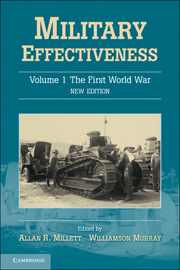Book contents
- Frontmatter
- Contents
- List of Contributors
- Preface to the First Edition
- Introduction: Military Effectiveness Twenty Years After
- Maps
- 1 The Effectiveness of Military Organization
- 2 Britain in the First World War
- 3 The Dynamics of Necessity: German Military Policy during the First World War
- 4 American Military Effectiveness in the First World War
- 5 Italy during the First World War
- 6 The French Army in the First World War
- 7 Japan, 1914–18
- 8 Imperial Russia's Forces at War
- 9 Military Effectiveness in the First World War
- Index
3 - The Dynamics of Necessity: German Military Policy during the First World War
Published online by Cambridge University Press: 05 June 2012
- Frontmatter
- Contents
- List of Contributors
- Preface to the First Edition
- Introduction: Military Effectiveness Twenty Years After
- Maps
- 1 The Effectiveness of Military Organization
- 2 Britain in the First World War
- 3 The Dynamics of Necessity: German Military Policy during the First World War
- 4 American Military Effectiveness in the First World War
- 5 Italy during the First World War
- 6 The French Army in the First World War
- 7 Japan, 1914–18
- 8 Imperial Russia's Forces at War
- 9 Military Effectiveness in the First World War
- Index
Summary
Introduction
This is a rather traditional historical account. The reader will scan what follows in vain for trendy sociological categorizations. These lie beyond my limited talents. Rather, this chapter seeks to analyze the military activity of Imperial Germany before and during the First World War at the political, strategic, operational, and tactical levels. It wishes neither to eulogize nor to condemn. Both the passage of time and the disappearance of anything remotely resembling the Royal Prussian Army or the Imperial German Navy leave little room for rancor or glorification. This paper will detail to what degree the German military operated efficiently within that strange federal composite called Imperial Germany; ‘the best administered, worst governed country in Europe.’
One should note at the outset that the discussion of army matters must come from published documents, memoirs, handbooks, official histories, and secondary accounts – due to the virtually total destruction of the erstwhile Prussian-German Army archives at Potsdam during Allied air raids in February 1942 and April 1945. Moreover, this chapter will deal primarily with the Prussian Army and its Great General Staff, rather than with the various federal contingents of Bavaria, Saxony, and Wurttemberg that comprised the peacetime German land forces. For in time of peace the Prussian king–German emperor possessed the right of‘inspection’ over these troops; and in time of war overall command of them devolved upon him and was largely exercised in his name through the Chief of the General Staff.
- Type
- Chapter
- Information
- Military Effectiveness , pp. 80 - 115Publisher: Cambridge University PressPrint publication year: 2010
- 2
- Cited by

